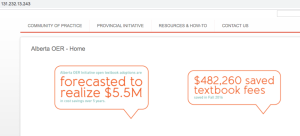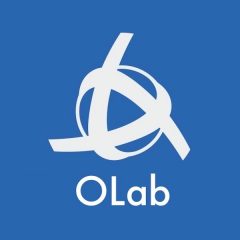An outsider’s look at what came out of the Alberta OER Program.
History of OERs
Alberta was quite late to the Open Educational Repository (OER) game. While there was some initial enthusiasm about the merits of OERs,(1) even in 2007, Stephen Downes pointed out some of the important factors that would need to considered in their overall design and use.(2) At the point when the ABOER project was launched in 2014, OERs had been around for a while and even at that point, there was quite a lot of criticism of their merits.(3)
In our own work, we had encountered several examples of attempted OERs: almost all of these consisted of miles of empty shelves, with great appearance and capacious stores but not much effort on addressing usability or paradata (information about how these resources had been used).
In full disclosure, recognizing several of the potential barriers to the success of such a project, we submitted an abstract that proposed some possible solutions to these barriers. We were disappointed, but not surprised, to be rejected – that is the nature of such grant calls and one never goes into these with the assumption of success.
This commentary is not a result of embittered rejection. We seek merely to use this project as an example that demonstrates most of the features around why OER projects tend to fail and to remind us all of the comments that Downes proposed way back in 2007,(2) which have largely been ignored.
Did the ABOER Program work?
The ABOER program ran from 2014 to 2017, when the funding expired. It is not at all unusual for educational programs to completely cease when the funds run out. ABOER continues, which is to their credit. But for $2M, what did they get for it?
We first looked for outputs from this program in spring 2021. A simple search for the program showed this web-site:
We found it pretty significant that a $2M project had a web site without a domain name for its final form. The domain, http://www.albertaoer.com/, which was referenced in their final report, did not exist.
UPDATE: On 20jan2024, it is accessible but has no SSL certificate (neither do most of the sites and resources).
The two bubbles on the home page featured this:

…which is somewhat like the falsely elevated claims which are not unusual for such projects, such as from Health Canada Infoway about the money saved, which have been disputed.
There was no reference for these claims on the ABOER site so they cannot be verified.
When you click on the link for the OER in their home page, http://www.albertaoer.com/content/repository, there was just an error.
UPDATE: Accessed again on 20jan2024 and it now works. There are 16 items in there. Wow. One item was a sub-OER on introductory maths, which had 2 items.
The same was true for their community of practice. http://www.albertaoer.com/community — this produced a ‘404 file not found’ error.
UPDATE: Accessed again on 20jan2024 – there is a community page, with a listing of community members and a few conversation threads. The files page still generates an error.
Their OER Starter Kit was a 14 page Google Doc. https://docs.google.com/document/d/162y7HdY4Lsu0nKzUimeaCMY2M-zBC41cR6CgjV_biGo/view – on 20jan2024, this was no longer accessible.
Their Champion’s Toolkit was a 10 page Google Doc. https://docs.google.com/document/d/1Fyt-dhaXwvGVHKv2ZB4HtphTNYCPsfl8m68Q_xw3CdQ/view on 20jan2024, this was no longer accessible.
Their resource page pointed to 6 short YouTube videos. http://131.232.13.243/howto
Their final report seemed to contain some very optimistic claims and projections.
Where were all these resources, such as online textbooks, that were funded? Did any of them get written? No sign of them.
UPDATE: On 20jan2024, you can now see the listing of objects. We wonder if any of them have been used. There is no indication of usage data on their web site.
We contacted program personnel on 27may2021 and they quickly responded that materials were being moved to the BCcampus repository. We were also provided with a link to Library Publishing for Open Textbooks (openeducationalberta.ca) – when we explored this, there was nothing beyond the front page, aside from a Collaboration Agreement that you have to complete, sign and email to the UofA library. In today’s world, this is a not a great example of easy, open accessibility.
But as noted in our various updates to the original commentary on this project, it is pleasing to note that you can now access the 16 items in this repository.
Value for money?
So did the learners of Alberta get good value for money in this program? Again, as noted above, we are not meaning to pick on this project’s team. It did reach completion, which is more than can be said of some similar projects. But we are using this specific example to highlight some of the factors that are typical for OER implementations.
Much of this was predicted by Stephen Downes in 2007. More recently, this relates to the points that we made in own publication on this topic:
- Topps, D., Wirun, C., & Ellaway, R. (2019). Getting Value from Open Educational Repositories. MedEdPublish. https://www.mededpublish.org/manuscripts/2428
In this article, we explored how to get value from an OER but that was after this project. But it references some works from that time where this question was already being raised. (3–5)
Ironically, we also note that our own article is not fully accessible and so we re-reference it here: https://www.researchgate.net/publication/333524090_Getting_Value_from_Open_Educational_Repositories
In summary, a valiant effort, but if we are to get value out of OERs, we must and can do better.
References
- Bossu C, Tynan B. OERs: new media on the learning landscape. Conway M, editor. Horiz. 2011 Sep 27;19(4):259–67.
- Downes S. Models for Sustainable Open Educational Resources. Interdiscip J Knowl Learn Objects Models Sustain Open Educ Resour. 2007;3:29–44.
- Kortemayer G. Ten Years Later: Why Open Educational Resources Have Not Noticeably Affected Higher Education, and Why We Should Care | EDUCAUSE. Educ Rev [Internet]. 2013 [cited 2019 May 8]; Available from: https://er.educause.edu/articles/2013/2/ten-years-later-why-open-educational-resources-have-not-noticeably-affected-higher-education-and-why-we-should-care
- Clark D. Donald Clark Plan B. 2015 [cited 2019 May 8]. 10 reasons why OER fails. CAVE dwellers (Colleagues Against Virtually Everything). Available from: http://donaldclarkplanb.blogspot.com/2015/05/is-closed-mindset-of-open-educational.html
- Clements K. Why Open Educational Resources Repositories Fail The Contribution of Quality Approaches to the Success of Repositories. University of Jyväskylä, Finland; 2016.

